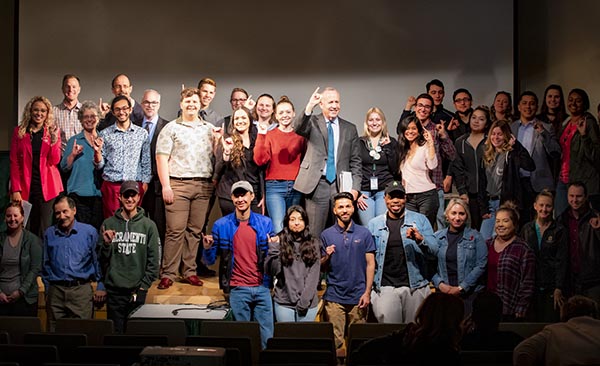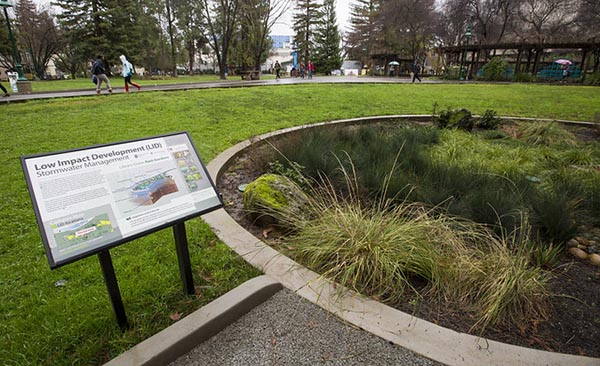 Mayor Darrell Steinberg joins students in a "Stingers Up" at the opening of the Student Climate Change Summit on April 10. (Sacramento State/Hrach Avetisyan) | More photos
Mayor Darrell Steinberg joins students in a "Stingers Up" at the opening of the Student Climate Change Summit on April 10. (Sacramento State/Hrach Avetisyan) | More photosPreview story: Earth Day comes to Sacramento State a little early this year, with the first-ever Student Climate Change Summit on Wednesday, April 10.
Students from Sac State, UC Davis, Sierra College, and the Los Rios Community College District (American River, Cosumnes River, Folsom Lake and Sacramento City colleges) will visit the campus to share their ideas for helping the region achieve carbon neutrality by 2045.
The summit is an offshoot of the Mayors’ Commission on Climate Change, a joint initiative by Sacramento Mayor Darrell Steinberg and West Sacramento Mayor Christopher Cabaldon. Sac State President Robert S. Nelsen is a commission member.
The Associated Students Inc. (ASI) Green Team, Sac State Sustainability, and the campus Environmental Student Organization are event sponsors. The summit serves as Sac State’s official Earth Day 2019 celebration, coming 12 days ahead of the nation’s official observation on April 22.
Steinberg is scheduled to speak at 9:30 a.m. in the University Union, Hinde Auditorium. Cabaldon will make his remarks at 5:30 p.m. in Carlsen Center for Innovation & Entrepreneurship, University Library 1520.
Student breakout discussions are set for 10:30 a.m., 12:30 p.m., and 6 p.m. in the Carlsen Center. They’ll discuss the built environment, mobility, community health and resiliency, equity, financing climate investment, community and youth engagement, and green jobs.
“This event is incredibly important, because climate change is an issue that needs immediate attention and action if we are to avoid irreversible damage,” said Rachael Dal Porto, ASI executive vice president.
“The mayors are allowing student and community input on the future of Sacramento, so we need to show up and speak out. We hope to gather as many students’ opinions as possible. We want them to apply what they’ve learned in their studies. Each student in our diverse body brings a different perspective to the table.”
 Among Sac State's sustainability efforts is the Low Impact Development project to capture stormwater. (Sacramento State/Jessica Vernone)
Among Sac State's sustainability efforts is the Low Impact Development project to capture stormwater. (Sacramento State/Jessica Vernone)Sacramento State has set a goal to reach full carbon neutrality by 2040, five years ahead of California’s deadline set by former Gov. Jerry Brown.
Sac State Sustainability is leading the University’s efforts to that end with projects such as the campus recycling center at the BAC Yard and the Living Building Challenge, a program of the International Living Future Institute.
This spring, Sac State students and others have hopped aboard the “futuristic” autonomous shuttles operating on Moraga Way. The University was awarded three months’ use of two electric Olli shuttles – the world’s first 3D-printed, co-created driverless vehicles – in manufacturer Local Motors’ inaugural Olli Fleet Challenge.
Sacramento State partnered with the Sacramento Area Council of Governments (SACOG) to secure the win, and SACOG covered the University’s cost of $88,000 to implement the project on campus.
Sac State is consistently recognized for its outstanding sustainability efforts.
In 2018, for instance, the California Higher Education Collaborative Conference gave the University an innovative-practices award for reducing campus organic waste at the BAC Yard.
Also last year, Sac State was rated116 out of 790 global campuses in the Universitas Indonesia’s UI GreenMetric World University Rankings. And the Association for the Advancement of Sustainability in Higher Education (AASHE) called Sac State a “top performer” in its 2018 Sustainable Campus Index. Sacramento State earned a Gold rating and was ranked 10th overall in the Master’s category.
“We as humans need to drastically reduce our carbon footprint,” Dal Porto said. “The summit will help students to become more aware of the problem at hand, while providing the solutions to frame how our city will address the issue and to what urgency.
“This is an equity issue, an environmental justice issue, and I hope this event allows our students’ voices to be heard, and unique perspectives to be considered,” she says. – Dixie Reid
